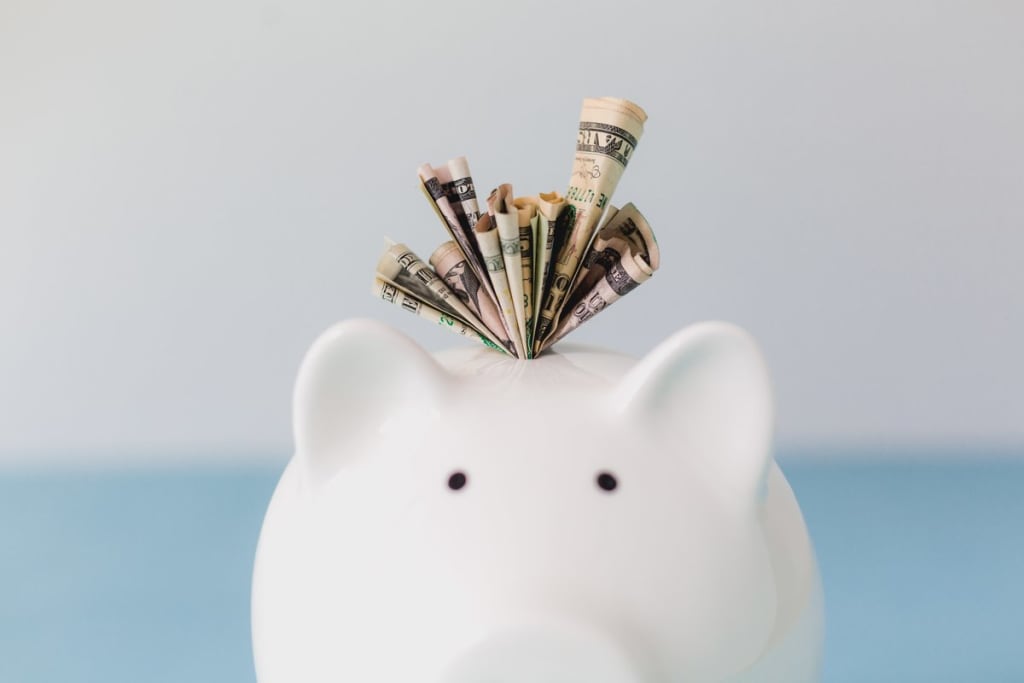Ways to Save for an Emergency Fund on a Budget
Yes, everyone should save for an emergency fund—and everyone can. This is true, even if you work at McD's.

It's no shocker that having cash on hand is great. A little bit of free money can help you get out of an emergency situation that would cost way more on credit, or worse, just be downright devastating if you didn't have money to avoid it. Even every trader should have an emergency fund.
Unfortunately, while it's easy to agree with something in theory, most people never seem to follow through. Most people know they should save for an emergency fund, but according to recent statistics, around 69 percent of Americans don't even have $1,000 in the bank.
This is really, really bad. Experts agree that everyone should try to have at least six months' worth of money to cover themselves if an emergency occurs. Thankfully, everyone can build a little emergency fund of their own with the right steps.
Speaking as someone who's done it themselves, these quick tips can help anyone make it happen.
When it comes to creating your own emergency fund, few things are quite as good as having an app that automates your savings. Qapital, for example, allows you to choose what rules trigger savings and directly deposits it to a spending account.
If you want to start investing that money (and aren't too shaken by the possibility of loss eating your cash up when you need it), you could also consider using some of the best micro-investing apps like Acorns or Stash to build up your value.
Automating your savings forces you to become aware of what your spending is like and also helps you understand what your spending habits are. That's why I'm a huge fan of using them when you're just starting to save for an emergency fund of your own.
That being said, if you want to make it happen faster, you will need to consider cutting out vices.
It's amazing how much that "once a day" treat tends to eat into your paycheck. Most people are aware of how much cigarettes can cost, but other vices are equally pricey. That money could be going to save for an emergency fund you need.
For example, I drink about three energy drinks a day. That turns into about $6 per day. In 30 days, when I switched to water, I saved around $180. Multiply that by 12 months, and you'll see how huge a difference it makes.
People on an extreme budget may want to pool together resources while shopping or living.

There's definitely buying power in numbers, especially when you make a very low income. If you're on a budget, you probably already have roommates and you might carpool.
Carpooling and having roomies can definitely help, but if you want to save for an emergency fund fast, you'll need to get creative. Here are some of the ways I saved up when I was broke:
- Get a warehouse shopping card, and split large produce purchases between groups of people. Let's face it, unless you have serious issues, you're not going to need eight pounds of avocado as a single person. However, if you have a bunch of friends who want to save on groceries, this can be an excellent time to hit up Costco and split that eight pound bag between three or four people.
- Barter, barter, barter. If you need to have a service done and it'll cost a lot of bank, don't be afraid to haggle or barter for it. I have one friend who advises me on car problems in exchange for a home-cooked meal, since he's not that great a cook.
- Ask around to find cheaper, better deals. Though it may be taboo in certain circles, it's far better to just ask around to find out where the best bargain buys are. A lot of the better ways to save won't be easy to find on the net. Friends can help you out. Hugely.
- Start hosting your own house parties, rather than hitting up bars. Bars and restaurants are PRICEY! The markup on them is huge. Throwing your own dinner parties and doing potluck-type stuff is an easy way to cut down bills while keeping an active social life.
- If you need to move apartments or buy a car, ask the person who's selling if they're willing to do group discounts. Realtors and car salesmen both are hungry as can be for customers. By seeing if you and friends who are in the same situation can get a discount, you might be able to get some fees erased.
- Don't be afraid to ask for help. You might be struggling and people would want to help you, but the truth is that no one will help you if you don't ask.
Get side jobs that pay you for things you already do.
If you absolutely, positively cannot trim any more fat from your budget, don't worry. You still have time and energy you can channel into making a good savings account. Here are some quick and easy jobs you can use to help save for an emergency fund in a pinch:
- House sitting. This is as simple as it gets. All you need to do is move into a home while owners are away, maintain the home as best as possible, and then get paid. Most homeowners will allow you to use the kitchen (not eat the food), use the net, and also use the washing machines, too. So, you save and you earn—all in one bit.
- Ubering. Though Uber and Lyft do have their pitfalls, the truth is that they do offer a good opportunity for people who drive on their way to work. Pick up a passenger, and you're good to go on gas.
- Becoming a personal grocery shopper. Ever heard of Instacart? Next time you're out doing groceries, pick up someone else's via Instacart, and you'll get paid for it once you deliver their goods.
Remember, you need to have a little extra income to protect from job loss. Should you lose your job, you will still be on the hook for money-related stuff.
There are oh, so many apps to help you manage your money! This is great, considering that you need to save for your emergency fund, right? Of course it is. Use tech to help you achieve your goals.
If you're paying full price, you're probably cheating yourself. Here are some of the better apps to help you save for an emergency fund while you're on a budget.
- Ibotta. This is my personal favorite app. Any time you go to the grocery store, buy booze, or even shop on eBay, you can get cash back through the app. It offers bonuses, Teamwork Goals, and even pays you for recruiting others. (Protip: Use Ibotta and Instacart together to max out your pay.)
- Acorns. Though it's technically a micro-investing app, Acorns also allows you to get more into your investing account by shopping on Acorns Found Money. All purchases take 120 days to clear, but hey, every little bit counts.
- Swagbucks. This app is known for having surveys you can complete for cash, but really, it also has good savings. That being said, they pressure you a LOT to buy.
Figure out whether you *really* have the best deals on recurring bills.
Whether it's cable, phone, or car insurance type bills, you can often find spare cash to save for an emergency fund by just shopping around. Here are some smart tips to consider:
- If you live in a place that has competition between cable companies, switch or threaten to switch. In a lot of cases, you'll get the same service with lower prices—or your current company will offer to lower your monthly rate.
- Call up your credit card company and ask for a lower interest rate. In many cases, they will actually lower it, especially if you claim that you're considering switching to another card.
- Grill your insurance agent for discounts. This is one of the things I learned that everyone should understand about car insurance before they get into an accident. Most insurance companies offer bundling as a way to help reduce costs. They also may have special discounts for longtime members, good grades, a good FICO score... You get the picture.
- Use BillShark to lower payments for you. BillShark is an app that allows you to automatically lower payments for things like your phone, cable, and more.
Consider getting some passive income in there.

If you are looking to begin investing in the stock market, or if you've been wanting to get passive income for a while, this might be a good time to do so. You could use the passive income in order to save for an emergency fund without having to work for it.
Investing in stocks, having an ETF portfolio, getting into a REIT, or even selling artistic rights to things you created can all help you make extra income. As long as you try to find ways to make money while you sleep, you'll do well for yourself.
Don't be afraid to say "no," and absolutely don't be afraid to cut people off.
Speaking from personal experience, a lot of people seem to really dislike having friends who don't want to spend money. I've personally had to let go of people who insisted that I cough up cash for drinks or opt to go to the "fancy bar" when I started to save for an emergency fund.
No is a full sentence. You don't owe them an explanation as to why you don't want to spend cash or why you can't do X, Y, and Z. If they really shame you for it, it may be time to look for new friends.
Oddly enough, investing in better people has led me to a better overall financial standing. Imagine that.
If you struggle with credit card debt, you may want to consider refinancing or loan consolidation.

Credit card debt piles up high, and can be very hard to deal with when you're trying to save for an emergency fund. Thankfully, there are some ways you can handle this hurdle with ease.
If you struggle making minimum payments, you may want to consider getting a card that has a 0% introductory APR and transfer over that debt. By having a no-interest credit card (even temporarily), you will be able to make a much larger impact on your payments.
You also may be able to refinance or consolidate your debt using lower interest loans. Payments would be lower than what you're paying now as a minimum, and you probably could use that extra cash to fund your emergency savings account.
While you're at it, you may want to stop using credit cards until you get a handle on things. Just saying.
Don't get discouraged if it doesn't seem to add up to much at first.
Saving up six months of absolutely necessary cash is not easy. It's a huge, huge number. In most cases, people will need a (very) bare-bones minimum of around $20,000 to just make ends meet—not even considering other issues.
That being said, you shouldn't feel let down if you've been saving and you haven't been getting as far as you should be with it. Even making it past that $500 mark is a huge step in the right direction and will make a big difference.
If you can save for an emergency fund—even if it's only $500—you're winning.
About the Creator
Cato Conroy
Cato Conroy is a Manhattan-based writer who yearns for a better world. He loves to write about politics, news reports, and interesting innovations that will impact the way we live.







Comments
There are no comments for this story
Be the first to respond and start the conversation.